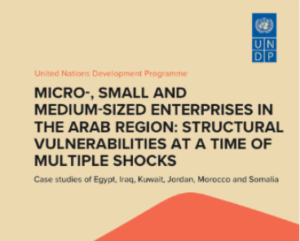 The recently published UNDP report “Micro-, Small and Medium-sized Enterprises (MSMEs) in the Arab Region: Structural Vulnerabilities at a time of Multiple Shocks” analyses the transmission mechanisms from the COVID-19 shock into the Arab region economies.
The recently published UNDP report “Micro-, Small and Medium-sized Enterprises (MSMEs) in the Arab Region: Structural Vulnerabilities at a time of Multiple Shocks” analyses the transmission mechanisms from the COVID-19 shock into the Arab region economies.
The report examines the economies of three country typologies in the Arab region that have been distinctly affected. These are oil-exporting countries (OECs), middle-income oil-importing countries (OICs) and fragile and crisis-affected countries (FCCs). The report uses Kuwait (an oil-exporting country), Egypt, Jordan and Morocco (middle-income OICs), and Iraq and Somalia (FCCs) (El-Haddad et al. 2021).
The COVID-19 crisis has highlighted pre-crisis structural deficits of countries across the region. The underlying reasons for these deficits are protected markets with limited competition, as well as the dominance of the state in many areas of the economy. This dominance of the state includes state monopolies and control, favoritism in awarding contracts and large public and a large civil service sectors. These factors are responsible for relatively low MSME firm density, substantial informality and economies dominated by large, old firms. Kuwait has one of the lowest MSME densities in the region and Jordan the lowest within the group of OICs.
This size and age distribution is problematic since it is smaller, younger firms which usually drive innovation, employment generation and growth in an economy. But public policy has stifled these firms. The crisis has exacerbated the situation, since MSMEs have been hardest hit, but government support has favoured larger firms.
The current crises have particularly exposed the vulnerability of oil exporting countries to the fact that oil wealth is only temporary. OECs cannot prosper in the long run without diversification. Although not sharing the same dependence on oil, OICs remain largely rentier economies, and in turn suffer from insufficient diversification and shackles preventing the economy from reaching its potential. These are also largely driven by the prevailing political economy, shaped by their own type of “unsocial” Social Contract. Many FCCs suffer the “double resource curse” of conflict and Dutch disease.
Thus, common policy recommendations to build back better are:
- reduce the state’s grip on the economy to create space for MSME growth, and private sector development more generally;
- guarantee a competitive and well-regulated telecommunication sector;
- strengthening the autonomy of their Competition Authorities is key to effecting the previous two recommendations;
- regulatory reforms and public financial management reform.

Schreibe einen Kommentar